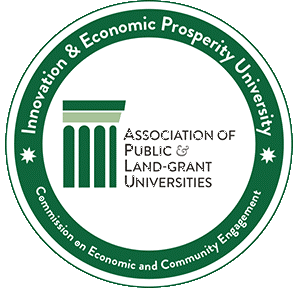October 20, 2025
MSU and Industry Partner Testify on Importance of Circular Economics at Michigan’s Capitol
Contact: Emily Springer, Communication Manager, Communication and Information Technology, University Outreach and Engagement, sprin116@msu.edu
Contact: Mary ZumBrennen, Assistant Director, Center for Community and Economic Development, University Outreach and Engagement, zumbrun1@msu.edu
LANSING, MI— At the onset of the government shutdown, representatives from MSU’s Center for Community and Economic Development (CCED) and Whirlpool Corporation testified before the Michigan House of Representative’s Natural Resources and Tourism Committee on the critical importance of circular economics.
Rex LaMore, Ph.D., director of CCED, spoke alongside Samantha Truesdell, sustainability director at Whirlpool, on Oct. 1. They advocated for circular economics, which aims to keep materials and products in circulation for as long as possible. The model reduces material use, redesigns materials and products to be less-resource intensive, and recaptures waste to manufacture new materials and products.
Making a shift to circularity is a necessary step for job creation, new market development, and environmental stewardship, LaMore said. “The linear paradigm— where materials are extracted, used in production, sold to consumers, and eventually thrown away— is an unsustainable material flow that places considerable stress on our environment and threatens our long-term growth,” he said.
The home appliance industry seeks to divert materials from landfill by using recyclable materials in its products, Truesdell said. “We strive for continuous improvement from an environmental sustainability lens, but also because we believe that the effective handling of products at the end of their useful life represents an opportunity for a positive final touch point with our consumers.”
A 2024 report from the Michigan Sustainable Business Forum estimated the state of Michigan will dispose of $6-8 billion in marketable material by 2035. Materials considered municipal trash have an estimated market value of $500-676 billion. Without new business practices, policies, and infrastructures, the state stands to lose an estimated half billion dollars in potential feedstock for its manufacturers, farms, and other end markets, also missing out on the potential creation of 4,500 jobs.
Olivia Schaefer, an MSU senior majoring in social relations and policy, attended the presentation along with several other students. “As a student at MSU, I’m deeply committed to shaping a future that works for all, including the broader state of Michigan,” she said. “It’s becoming increasingly clear that developing a circular economic model is the first, and perhaps most important, step in protecting our collective future.”
In 2020, CCED began building a circular economic faculty network as part of an economic resiliency grant from the U.S. Department of Commerce, Economic Development Administration. Today, more than 70 scholars participate in the network from MSU-affiliated colleges, and an additional 60, representing both on- and off-campus partners, focus on resiliency through research, education, and outreach.
“A circular economy requires forethought and supportive integration to achieve the level of collaboration necessary to maximize salvage and reuse,” LaMore said. "On the global stage this new conception of material use is gaining traction with consumers, industry partners, and policy makers.”









